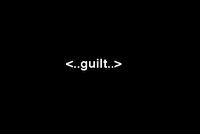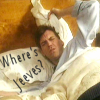 My wise graduate school buddy Jan once said, “Guilt is never a good reason to do anything.” I do agree with this sentiment, though I long ago lost count of the wide variety of things I have done and the countless times I have done them out of guilt. I joke that it is inherent in the Jewish experience (and the Catholic, Baptist, and, well, pretty much all of the Judeo-Christian tradition—which explains my friends who’ve become Pagans as well as those who’ve become atheists perhaps better than just about anything else I can think of), but it does burden me.
My wise graduate school buddy Jan once said, “Guilt is never a good reason to do anything.” I do agree with this sentiment, though I long ago lost count of the wide variety of things I have done and the countless times I have done them out of guilt. I joke that it is inherent in the Jewish experience (and the Catholic, Baptist, and, well, pretty much all of the Judeo-Christian tradition—which explains my friends who’ve become Pagans as well as those who’ve become atheists perhaps better than just about anything else I can think of), but it does burden me.Now, I’m better than I used to be, working harder to distinguish purely guilt-induced motive from guilt-plus, where there is some other reason I might do something as well as a little guilt engine driving it. Compromise, the Golden Mean. I still haven’t gotten to the anti-guilt state my friend Rick touts, embodied in his slogan “Always take more than your fair share of the available resources.” Even though he is careful to point out the qualifier “available” here, it just smacks of more greed than I can usually muster. (But then, I’ve seen Rick, too, knuckle under to guilt, that Great Equalizer—we all do.)
This topic came up for me this morning in particular as I watched my son amble off from my car to his first-grade classroom. Chewing his hair a bit, walking with a casual, weaving gait, he was making his way casually and calmly. I caught myself thinking, as I have thought before, how he has his own little life that I am not part of. And how that is FINE. I want him to have a life of his own. For one, it takes some responsibility off me for what his moment-by-moment existence consists of. This is not to say I like our educational system, Bush’s inane and evil “No Child Left Behind” test-mania plan, our particular grammar school, or my son’s particular teacher. But I like knowing my child has some responsibility for himself as he makes choices of friends, playthings, how to color his worksheet, when to ask for a drink of water, and what in his lunch to eat and what to mash into a little ball in the bottom of his lunchbox for me to clean out. And I like this, at least in part, because it frees me of responsibility (a.k.a. guilt) for a few hours of the day.
(This definitely clarifies why being the parent of an infant was so horrific for me. There is no moment of the day when you are not totally responsible for an infant, and with my guilt already riding high, having an infant pushed me over the edge for a while, even with a superb co-parent along for the ride.)
Taking care of others’ needs is really tough for me. I do it lots, and I’m good at it. It has been a big part of my psyche from a very young age. But being good at it means it drains me. More specifically, I’m thinking as I type this, responsibility and guilt are very much blurred in my worldview. The difficult but intelligent Papusa Molina once said in a workshop on diversity, “Responsibility can be defined as the ability to respond.” Who can respond should. Who can’t need not feel guilty every moment of the day over it. But to what in this life can I not respond, with all my middle-class privilege (while others starve, suffer, die)?
How much money to charity is too much?
How many rescued pets is too many?
How often is leaving our son with a sitter too many?
How many visits to family instead of vacations is enough?
How many cookies are too many?
How often can you just let the phone ring and not answer it?
How often is often enough for taking the dog for a walk?
How long can you avoid housework without feeling like the Queen of Filth?
How much money do you give to friends whom you want to tell to “learn to budget”!
When will I stop feeling guilty that I had only one child?
How much work is enough, and when will I feel like “enough” IS enough?
The list goes on and on, and some days are better than others. Some days I don’t ask any of those questions at all. But most days I at least ask some. And, honestly, I think I differ from others not in how many questions I ask myself or how frequently I ask them (my guilt does usually come in leading question form, not in exclamation) but in how openly I admit (to myself and others) that I have such guilt.
“Just don’t worry about it” doesn’t work for me any more than for most of my friends and family. But some people are much better at blocking than others. And I know I annoy my friends most when what I say and do interferes with their blocking ability. When I confess to guilt, I bring up the subject for them. Sorry, friends, that’s just how it is. In fact, it's part of my best self, the one that analyzes and processes and works to make sense of things rather than just letting life flow by unquestioned. (Wow, not much guilt about being myself on that score apparently, hoorah!)
Actually, despite the sometimes crushing burden of guilt I take on, I do like myself. I do like my “ability to respond” and willingness to do so on many fronts. Perhaps this is a defensive strategy, praising myself for how much guilt I take on. But what else is our personality made up of apart from ways of seeing and ways of defending our ways of seeing? Coping strategies, blocking strategies—all kinds of strategies that spin around in our over-evolved heads. All that and blogging (don’t want to let too much time slip between posts or I’ll feel guilty about THAT!) keeps me a happy, busy (and busy-ness is next to godliness) human bean.




